Module 12 Save our world Unit 1 If everyone starts to do something, the world will be saved.习题课件(58张
文档属性
| 名称 | Module 12 Save our world Unit 1 If everyone starts to do something, the world will be saved.习题课件(58张 |  | |
| 格式 | zip | ||
| 文件大小 | 302.4KB | ||
| 资源类型 | 教案 | ||
| 版本资源 | 外研版 | ||
| 科目 | 英语 | ||
| 更新时间 | 2019-06-19 16:36:34 | ||
图片预览

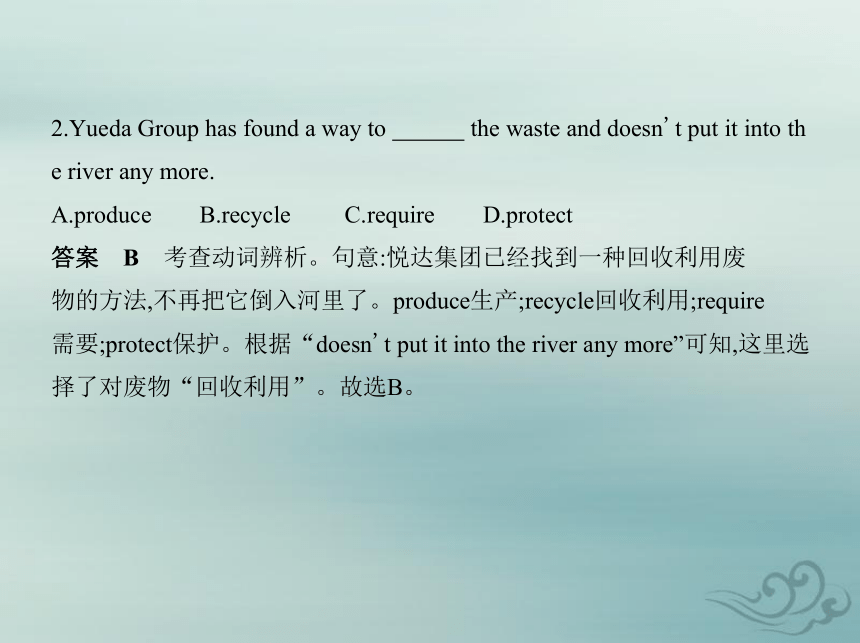

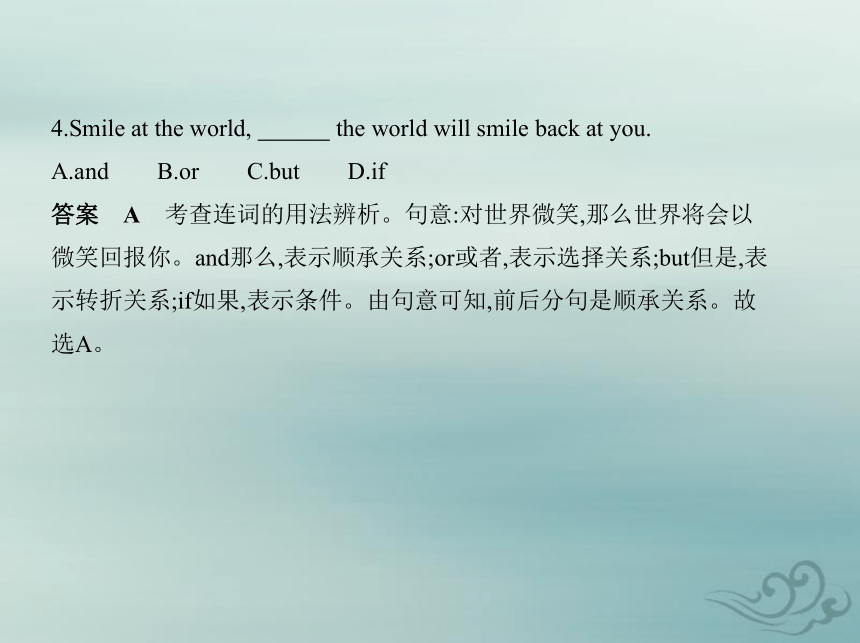
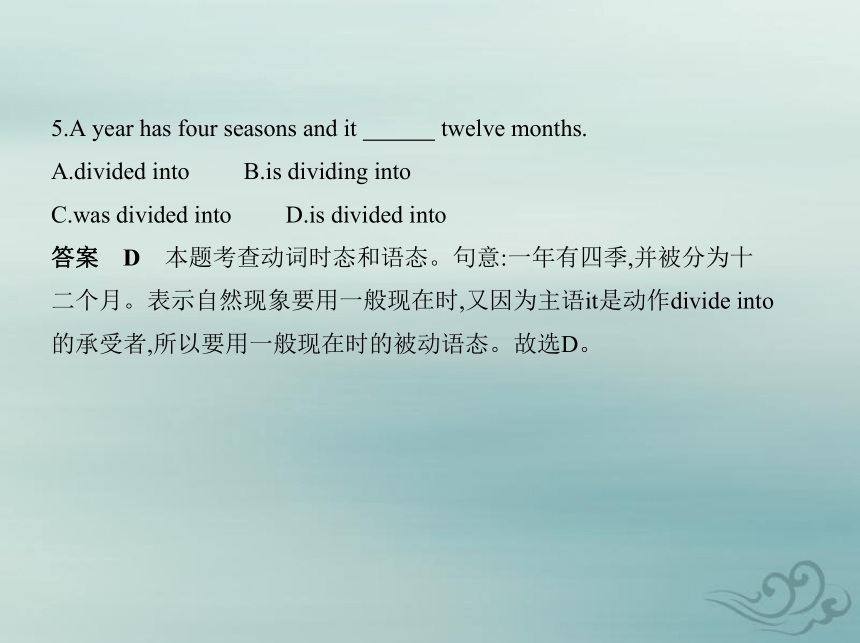
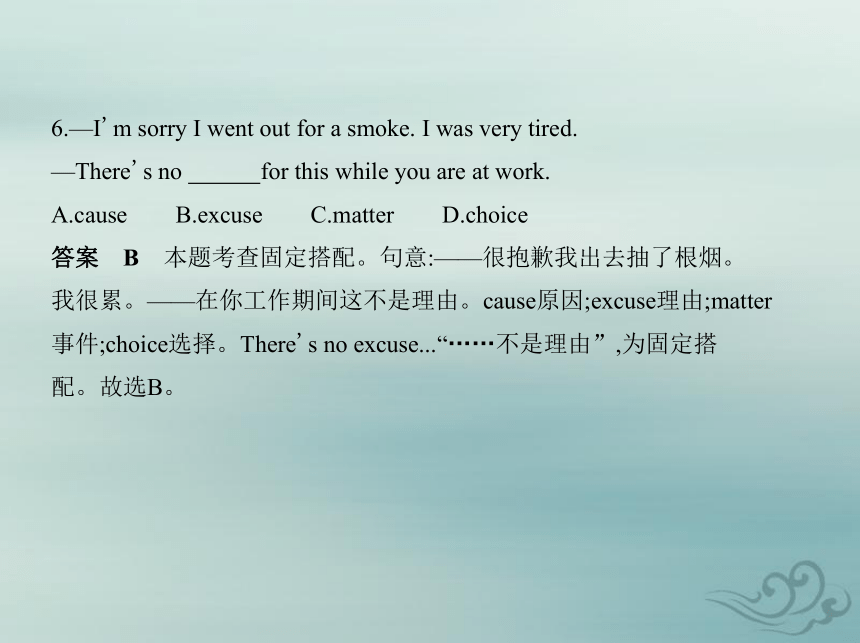
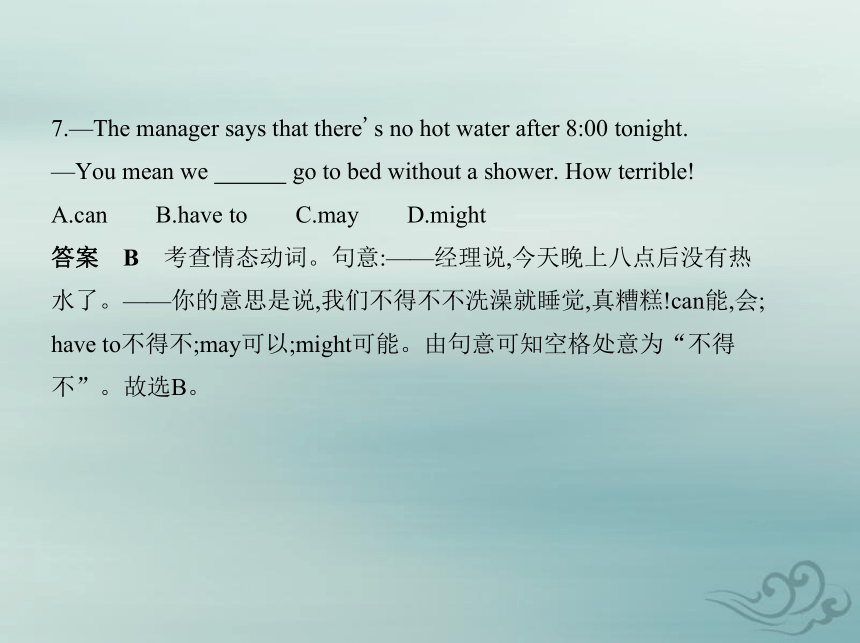
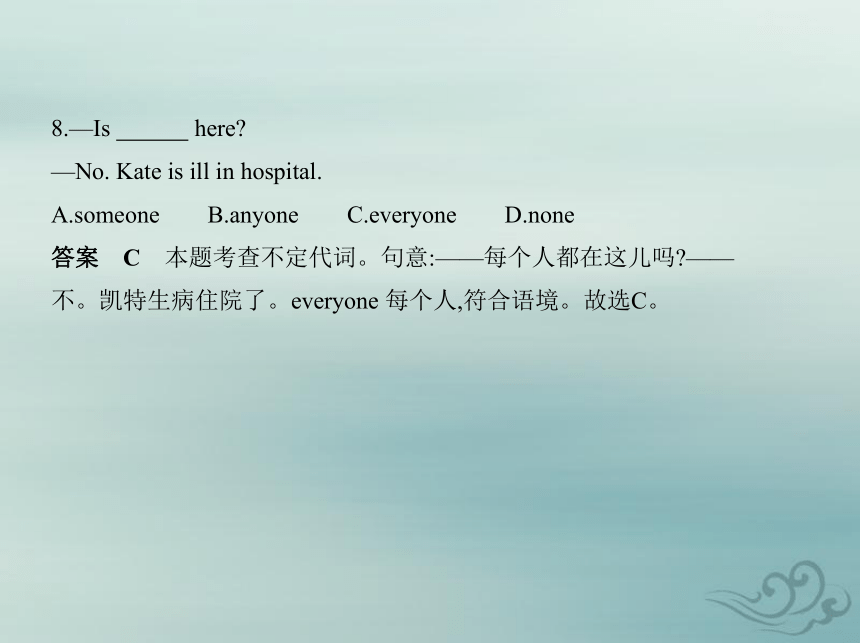
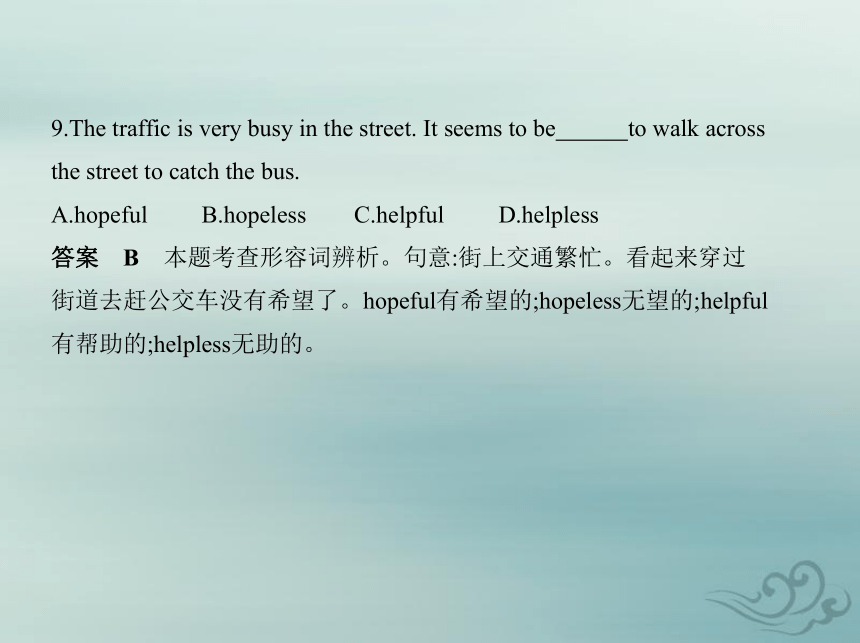
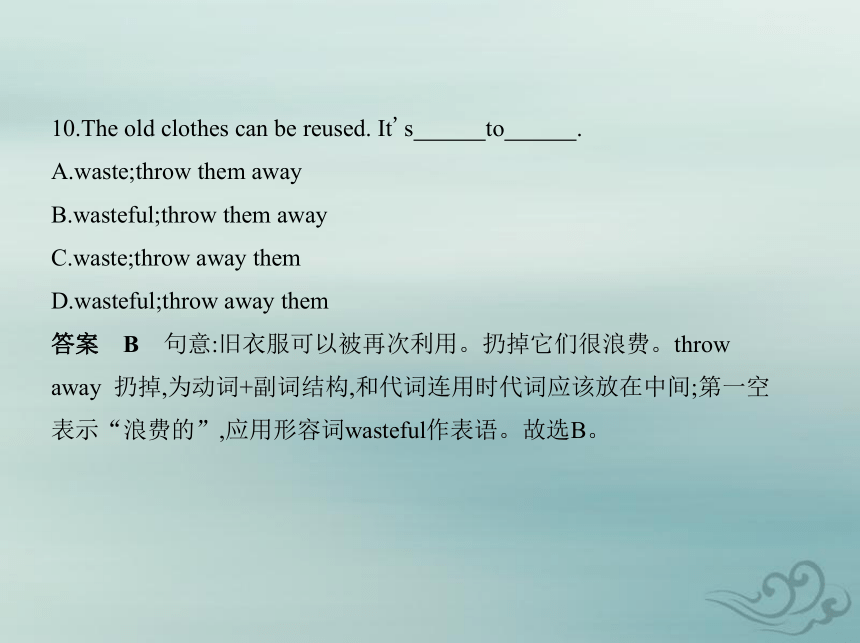

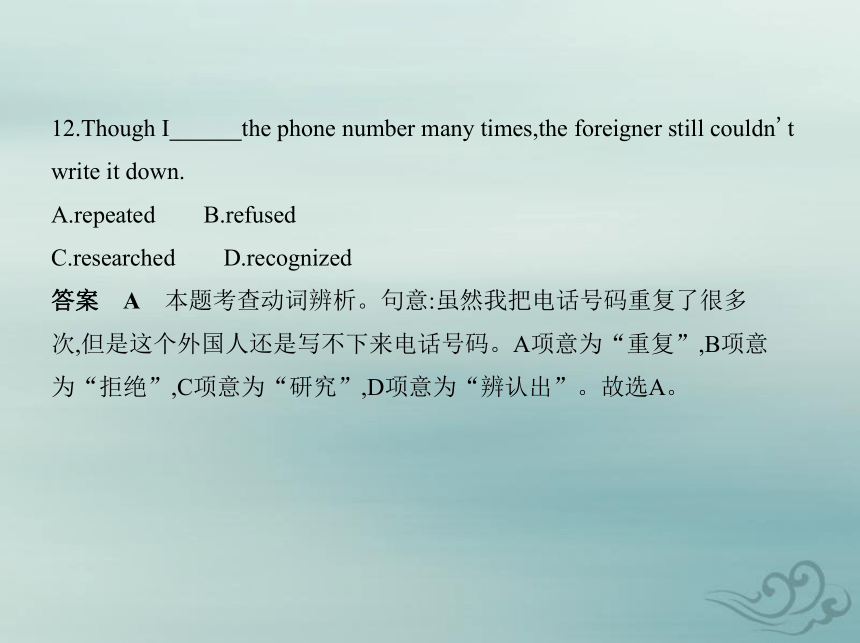
文档简介
课件58张PPT。Ⅰ.单项选择(每小题1分,共15分)
1.We all need a healthy environment, but we produce ???? every day and it is harmful to our environment.
A.dreams B.trouble C.problems D.waste
答案????D 本题考查名词辨析。句意:我们都需要一个健康的环境,但 是我们每天产生垃圾,它对我们的环境有害。dream梦想;trouble麻烦; problem问题;waste垃圾。根据“它对我们的环境有害”可知选D。
2.Yueda Group has found a way to ???? the waste and doesn't put it into the river any more.
A.produce B.recycle C.require D.protect
答案????B 考查动词辨析。句意:悦达集团已经找到一种回收利用废 物的方法,不再把它倒入河里了。produce生产;recycle回收利用;require 需要;protect保护。根据“doesn't put it into the river any more”可知,这里选择了对废物“回收利用”。故选B。
3.—Could you please fix my phone?
—Sorry. The shop next may be ????.
A.useful B.helpful C.careful D.hopeful
答案????B 考查形容词辨析。句意:——请问你能维修一下我的手机 吗?——很抱歉,隔壁的那家商店或许能给你提供帮助。useful有用的; helpful有帮助的;careful小心的;hopeful满怀希望的。由Sorry可知回答 的人帮不上忙,隔壁的商店可能会维修手机。故选B。
4.Smile at the world, ???? the world will smile back at you.
A.and B.or C.but D.if
答案????A 考查连词的用法辨析。句意:对世界微笑,那么世界将会以 微笑回报你。and那么,表示顺承关系;or或者,表示选择关系;but但是,表 示转折关系;if如果,表示条件。由句意可知,前后分句是顺承关系。故 选A。
5.A year has four seasons and it ???? twelve months.
A.divided into B.is dividing into
C.was divided into D.is divided into
答案????D 本题考查动词时态和语态。句意:一年有四季,并被分为十 二个月。表示自然现象要用一般现在时,又因为主语it是动作divide into 的承受者,所以要用一般现在时的被动语态。故选D。
6.—I'm sorry I went out for a smoke. I was very tired.
—There's no ????for this while you are at work.
A.cause B.excuse C.matter D.choice
答案????B 本题考查固定搭配。句意:——很抱歉我出去抽了根烟。 我很累。——在你工作期间这不是理由。cause原因;excuse理由;matter 事件;choice选择。There's no excuse...“……不是理由”,为固定搭 配。故选B。
7.—The manager says that there's no hot water after 8:00 tonight.
—You mean we ???? go to bed without a shower. How terrible!
A.can B.have to C.may D.might
答案????B 考查情态动词。句意:——经理说,今天晚上八点后没有热 水了。——你的意思是说,我们不得不不洗澡就睡觉,真糟糕!can能,会; have to不得不;may可以;might可能。由句意可知空格处意为“不得 不”。故选B。
8.—Is ???? here?
—No. Kate is ill in hospital.
A.someone B.anyone C.everyone D.none
答案????C 本题考查不定代词。句意:——每个人都在这儿吗?—— 不。凯特生病住院了。everyone 每个人,符合语境。故选C。
9.The traffic is very busy in the street. It seems to be ????to walk across the street to catch the bus.
A.hopeful B.hopeless C.helpful D.helpless
答案????B 本题考查形容词辨析。句意:街上交通繁忙。看起来穿过 街道去赶公交车没有希望了。hopeful有希望的;hopeless无望的;helpful 有帮助的;helpless无助的。
10.The old clothes can be reused. It's ????to ????.
A.waste;throw them away
B.wasteful;throw them away
C.waste;throw away them
D.wasteful;throw away them
答案????B 句意:旧衣服可以被再次利用。扔掉它们很浪费。throw away 扔掉,为动词+副词结构,和代词连用时代词应该放在中间;第一空 表示“浪费的”,应用形容词wasteful作表语。故选B。
11.He was advised to eat fewer hamburgers and drink ???? cola to keep fit.
A.much B.more C.fewer D.less
答案????D 考查形容词比较级。句意:他被劝告为了保持健康要少吃 汉堡,少喝可乐。fewer较少的,修饰可数名词复数;less较少的,修饰不可 数名词。cola 是不可数名词,用less修饰。故选D。
12.Though I ????the phone number many times,the foreigner still couldn't write it down.
A.repeated B.refused
C.researched D.recognized
答案????A 本题考查动词辨析。句意:虽然我把电话号码重复了很多 次,但是这个外国人还是写不下来电话号码。A项意为“重复”,B项意 为“拒绝”,C项意为“研究”,D项意为“辨认出”。故选A。
13.—I want to go to Renmin Park. How can I get there?
— ???? there, just go along this street and turn left at the third crossing.
A.To get B.Getting C.Get D.Got
答案????A 考查非谓语动词的用法。句意:——我想去人民公园,我 怎样去那里?——要到那里去,只需要沿着这个街道走并在第三个十字 路口向左拐。由句意可知,这里用动词不定式作目的状语。故选A。
14.We will go camping if it ???? tomorrow.
A.rained B.doesn't rain
C.will rain D.won't rain
答案????B 考查动词时态。句意:如果明天不下雨,我们将去野营。 分析句子结构可知,本句是含有if引导的条件状语从句的复合句。主句 用了一般将来时,if引导的条件状语从句要用一般现在时表将来。故选 B。
15.—It's a fine day today. Shall we go swimming?
— ???? But we need to be home before six o'clock.
A.Have a nice time! B.Not at all.
C.You are right. D.Nice idea!
答案 D 本题考查交际用语。句意:——今天天气很好。我们去游 泳好吗?——好主意!但是我们需要六点前到家。根据句意可知选D。
Ⅱ.完形填空(每小题1分,共10分)
March 22nd is World Water Day. It started in 1993. It not only makes us think about the importance of water, but also calls on (号召) us to 16???? and protect water. Today, we're facing terrible water problems. Among them, the wastewater problem is especially 17????. And the subject of World Water Day in 2017 is “wastewater”.
What is wastewater? It is used water. Usually, wastewater comes from homes, 18????, hospitals and so on. It is produced by different kinds of ac-tivities, including washing the machines, taking showers and using the kitchen. The rain also 19???? wastewater when it is running down the street during a storm. No matter where it comes from, this kind of water is sure to have 20???? harmful in it.
21???? must we treat(处理) wastewater? Wastewater has a big influence on our life. It causes both illness for us,and pollution for the environment. We must care for our environment and our own 22????.
How can we treat wastewater? Different kinds of wastewater need different ways of treatment. Wastewater 23???? homes can be reused. Then there will be 24???? wastewater. Also, factory wastewater has to be cleaned 2 5???? it goes back to nature.16.A.drink B.save C.carry D.watch
17.A.easy B.popular C.small D.serious
18.A.factories B.lakes C.rivers D.seas
19.A.gets back B.hands in
C.changes into D.picks up
20.A.nothing B.something
C.nobody D.somebody
21.A.What B.Who C.Why D.How
22.A.work B.interest C.health D.business
23.A.on B.for C.with D.from
24.A.less B.more C.better D.worse
25.A.and B.whether C.after D.before答案????
[语篇解读] 本文是一篇说明文。首先介绍水问题的严重性,尤其是废 水问题,然后分析解决废水问题的重要性,最后给出了几点解决废水问 题的建议。
16.B drink 喝;save挽救;carry抬;watch观看。句意:它不仅让我们思考 水的重要性,而且号召我们节约用水,并且保护好水资源。故选B。
17.D easy容易的;popular受欢迎的;small小的;serious严重的。根据上 句中的terrible,可知水问题很严重,此处表示“废水问题尤其严重”。 故选D。
18.A 结合语境可知有的废水来自工厂。故选A。
19.C get back回来;hand in上交;change into变成;pick up拾起。句意:在 暴风雨期间,雨水流入街道也会变为废水。故选C。20.B 句意:无论它来自哪里,这种水里一定存在某些有害物质。此处 指“某些东西”,表示肯定意义。故选B。
21.C 句意:我们为什么必须处理废水?why用来提问理由。故选C。
22.C work 工作;interest 兴趣;health健康;business商业。句意:我们必 须关心我们的环境和我们自身的健康。根据上句中的illness并结合本 句句意可知选C。
23.D 结合语境可知谈到的是“来自家庭的废水可以被再次使用”。 from意为“来自”。故选D。
24.A less更少的;more更多的;better更好的;worse更糟的。结合上文语 境“来自家庭的废水可以被再次使用”,可知废水会变得更少。故 选A。
25.D and 和;whether是否;after 在……之后;before在……之前。句意: 而且,工厂的废水在放回自然之前,必须被清洁处理。故选D。All living things need energy to live and grow. This energy comes first Ⅲ.阅读理解(每小题2分,共30分)
Afrom the sun. Plants use water and sunlight to make their own food. Ani- mals cannot make their own food, and they eat plants. Other animals then eat the plant eaters.
A food chain shows what eats what. It might show that zebras eat grass and then lions eat zebras.
Lions also eat other animals. Zebras eat other kinds of plants. So it takes more than one food chain to show how lions and zebras get their en- ergy.
A food web shows how food chains work together. From it we can see how energy moves from plants to animals.
Plants and animals that live in hot, dry deserts depend on water as well as food. Creosote bushes have small leaves that hold water. Their seeds provide food and water for kangaroo rats. Kangaroo rats don't need to drink water. They get all the water they need from the plants they eat. Kangaroo rats keep cool by coming out only at night to look for food. Ringtail cats also come out only at night. Ringtail cats hunt and eat kanga- roo rats. Coyotes eat both the kangaroo rats and the ringtail cats.
Nothing is wasted in a food wed. Vultures eat dead animals. Vultures are scavengers. Scavengers do not hunt or kill other animals to get food. They eat animals that are already dead. When a ringtail cat or a coyote dies, it makes a meal for the vultures. Scavengers do an important job in keeping the environment clean.26.Where does the energy that living things need first come from?
A.Animals. B.Plants.
C.The sun. D.Plant eaters.
27.Why do ringtail cats come out only at night?
A.Because they are afraid of coyotes.
B.Because they are shy animals.
C.Because it is very hot in the daytime.
D.Because they can eat kangaroo rats.
28.What kind of animal can be placed in the empty box of the picture?
A.Kangaroo. B.Vulture.
C.Cat. D.Zebra.29.Which of the following is NOT TRUE according to the passage?
A.Lions eat different kinds of animals.
B.Plants are on the top of the food chain.
C.Scavengers can keep the environment clean.
D.Some animals get water from the plants they eat.
30.What's the best title of the passage?
A.Web of life
B.Things that we eat
C.Food in the desert
D.The place where food is from
答案????
[语篇解读] 本文是一篇说明文。介绍了自然界中食物链的构成和循 环。
26.C 细节理解题。根据文中第一段第二句“This energy comes first from the sun.”可知,生物最初需要的能量来自太阳。故选C。
27.D 细节理解题。根据文中第五段倒数第三句和倒数第二句“Ring- tail cats also come out only at night. Ringtail cats hunt and eat kangaroo rats.”可知,环尾猫仅在夜间出来是为了捕捉长鼻袋鼠吃。故选D。
28.B 细节理解题。根据文中最后一段倒数第二句“When a ringtail cat or a coyote dies, it makes a meal for the vultures.”可知,秃鹫吃环尾 猫和北美丛林狼。故选B。29.B 推理判断题。根据第一段第三、四句“Plants use water and sun- light to make their own food. Animals cannot make their own food, and they eat plants.”可知,植物不处于食物链的顶端。故选B。
30.A 主旨大意题。本文介绍了自然界中食物链的构成和循环。A项 “生命之网”;B项“我们吃的东西”;C项“沙漠里的食物”;D项“食 物的来源”。故选A。B
Andrew Holleman, a 12-year-old boy, loved playing in the open land near his home. The land was wet and forested, and made a home for birds, other animals and many different plants.
It made the perfect place for him to study and get to know the nature. He had seen some red-tailed hawks, red foxes, wood turtles and other animals. He also found special native flowers.
Suddenly it was announced that the “empty” land would be improved by a lot of houses on it. The plants would be removed, the animals would run away and most would probably die. Then the wet soil(土壤)would be cov- ered with extra grounds.When he heard about the news, he was not happy. He was very worried that the land and water would be polluted.
Andrew wrote down clearly all the research he had done about the area, and how the houses would affect(影响)the local environment. He sent let- ters to members of the local government and television reporters. He also called on his neighbors to oppose the building of the houses.
Although he was only 12 years old, he had the courage and wisdom of a
person much older. Andrew's teachers described him as gentle, shy and ac- tive. His classmates also admired how much he knew about local animals and plants, and the environment. Each day after school, Andrew went door-to-door, to ask the people to sign(签名), who did not want the houses to be built. In only one month, he got the signatures of 250 people.
In the end, the land remained a safe place for birds, animals and plants that belonged there.
Andrew won many prizes for his brave and great work to stop the houses being built, and thus help save the environment.
31.The passage is mainly about ????.
A.250 people who signed to help Andrew
B.a brave boy who cared for the environmentC.the open land that suited animals and plants
D.the research of improving the environment
32.The underlined word “oppose” in the passage probably means ????.
A.support B.dislike C.disagree D.prefer
33.Andrew was very worried because ????.
A.the animals would be killed
B.new houses would be built on the open land
C.not all the neighbors were going to sign
D.the local government made a right decision34.According to the passage, Andrew ????.
A.was good at going door-to-door
B.got in no touch with the reporters
C.usually acted like a person much older
D.was praised by his teachers and classmates
35.We can infer(推测)that ????.
A.the land would remain as it used to be
B.the open land would be built into a park
C.the neighbors would have to move away
D.Andrew would soon work for the government
答案????
[语篇解读] 本文是一篇记叙文,讲述了12岁少年安德鲁保护环境的故 事。
31.B 主旨大意题。根据全文可知,少年安德鲁为保护当地环境做了大 量的工作。故选B。
32.C 词义猜测题。根据第四段可知,建造的房屋对当地的环境影响很 大。所以,他应该是号召邻居们反对建造房子。support 支持;dislike 不 喜欢;disagree 不同意;prefer 更喜欢。故选C。
33.B 推理判断题。根据第三段和第四段可知,安德鲁担心当地的土地 和水遭受污染,担心动植物失去家园。这一切都是由在户外的土地上修 建房屋所引起的。故选B。
34.D 细节理解题。根据第六段内容可知选D。
35.A 推理判断题。根据第七段可知,那块土地仍保留原貌,故选A。C
Many people know that rubbish is a big problem on planet Earth. What many people don't know is that junk(垃圾)has become a problem in outer space too.
According to BBC News, there are more than 22,000 pieces of space junk floating around the earth. And these are just the things that we can see from the surface of the earth by telescopes(望远镜). There are also millions of smaller pieces of junk that we can't see.
Objects, like bits of old space rockets or satellites, move around the planet at very high speed, so fast that even a very small piece can break important satellites or become dangerous to astronauts. If the tiniest piece of junk crashed into a spaceship, it could damage the vehicle.
To make things worse, when two objects in space crash, they break into many smaller pieces. For example, when a U.S. satellite hit an old Russian rocket in 2009, it broke into more than 2,000 pieces, increasing the amount of space junk.
To reduce additional space junk, countries have agreed that all new space tools can only stay in space for 25 years at most. Each tool must be built to fall safely into the earth's atmosphere after that time. In the upper parts of the atmosphere, it will burn up.Many scientists are also suggesting different ways to clean up space junk. In England scientists are testing a metal net that can be fired into space junk. The net catches the junk and then pulls it into the earth's atmosphere to burn up. The Germans are building robots that can collect pieces of space junk and bring them back to Earth to be safely destroyed.
“The problem is becoming more challenging because we're sending more objects into space to help people use their mobile phones and comput- ers,”says Marco Castronuovo, an Italian space researcher.
“The time to act is now. The longer we leave the problem, the bigger it will become,”he says.36.What does the underlined word “these” in Paragraph 2 refer to?
A.Telescopes. B.Satellites.
C.Pieces of space junk. D.BBC news reports.
37.Why is space junk considered a problem?
A.It burns up after it re-enters the atmosphere.
B.It often stops the view of telescopes on Earth.
C.It could force new space tools to travel at slower speed.
D.It may crash into other space tools causing damage or death.
38.Countries want future space tools to be able to fall back into the earth's atmosphere so that ????.
A.the tools can be reused later
B.the tools don't become space junkC.the earth's atmosphere can stay clean
D.the effects of space flight can be studied
39.How do the Germans plan to deal with space junk?
A.Catch it with nets.
B.Use robots to collect it.
C.Burn it in the earth's atmosphere.
D.Send it further away from the earth.
40.In which section of the newspaper would you probably read this article?
A.Environment. B.Local News.
C.Education. D.Fashion.答案
[语篇解读] 本文是一篇说明文,讲述了日益严重的外太空垃圾问题以 及一些国家对此问题的处理情况。
36.C 细节理解题。根据第二段第一句“...there are more than 22,000 pieces of space junk floating...”和下文的“There are also millions of smaller pieces of junk...”可知these指的是“太空垃圾碎片”,故答案为 C项。
37.D 细节理解题。由第三段第一句“...even a very small piece can break important satellites or become dangerous to astronauts.”可知即使 一小块(垃圾)都有可能击破卫星或者对宇航员造成危险,故答案为D 项。38.B 细节理解题。根据第五段最后一句“In the upper parts of the at- mosphere, it will burn up.”可知太空工具可在大气层外层烧毁,那么它 们就不会成为太空垃圾了,故答案为B项。
39.B 细节理解题。根据第六段最后一句“The Germans are building robots that can collect pieces of space junk and bring them back to Earth to be safely destroyed.”可知德国人正在制造机器人去收集太空垃圾碎 片,故答案为B项。
40.A 主旨大意题。本文主要讲述太空垃圾的问题,属于环境问题,A项 “环境”与题意吻合,故答案为A项。
Ⅳ.选词填空(每小题1分,共10分)
根据短文内容,从方框中选择恰当的单词填空。每个单词只能用一次, 每空一词。
before parks money usual pollution going
be carry ones slower
A kind of little cars may some day take the place of today's big ones. People will like this kind of small cars more and more. The car is as small as a bike but can 41???? two people in it. Everybody can drive it, just like riding a bike. Even children and old people can drive them to schools and 42????.
If everyone drives such a car in the future, there will be less 43???? in the air. There will also 44???? more space for all the cars in cities, and the streets will have more space for people to walk. Three such cars can fit in the space now needed for one car of the 45???? size.
The little cars of the future will cost much less 46???? to own and to drive. And they can go only 65 kilometers an hour, so driving will be safer, too.
The cars of the future will be fine for 47???? around a city, but they will not be useful for a long trip.
This kind of cars can save a lot of gasoline(汽油). They will go 450 kilo-meters 48???? needing to stop for more gasoline.
If big cars are still used along with the small 49????, two sets of roads will be needed in the future. Some roads will be needed for the big, faster cars and other roads will be needed for the small, 50???? cars.
???? 42. ???? 43. ???? 44. ???? 45. ????
46. ???? 47. ???? 48. ???? 49. ???? 50. ????
答案
[语篇解读] 本文讲述随着社会的发展,人们会越来越喜欢开更小的汽 车。因为它们有很多的优点:占地面积小、省油、安全等。
41.carry 句意:这种车和自行车一样小,但是可以运送两人。根据备选 项可知,应填carry,意为“运送”。
42.parks 句意:甚至小孩和老人都可以驾驶它们去学校和公园。and连 接前后两个并列的词语,由and前面的schools可知,and后面也应填写一 个表示地点的复数名词,根据备选项可知应填parks。
43.pollution 句意:如果将来每个人都开着这样一辆车,空气中的污染 将会更少。由句意及备选项可知应填pollution,意为“污染”。
44.be 句意:城市里也会有更多的空间给所有的汽车……。由句子时 态可知,此处应填be。45.usual 根据语境可知应填usual,the usual size指的是“通常的尺寸”。
46.money 句意:拥有和驾驶未来的小汽车将花费更少的钱。由句中 cost“花费”可知,此处指花费金钱,故填money。
47.going 句意:将来的汽车适合在城市周围驾驶,但是不适合长途旅 行。根据句意,并由介词for可知此处应填动名词going。
48.before 句意:在需要停下来加油之前,它们可以行驶450千米。根据 句意可知此处应填表示时间前后关系的介词before。
49.ones 句意:如果大型汽车仍然与小型汽车一起使用,将来会需要两 套道路。在这里ones是为了避免重复而使用的,指代了前面出现过的汽
车。
50.slower 句意:一些道路将被大型、更快速的汽车需要,而其他的道 路则被小型、更慢的汽车需要。faster与slower两个意思相反的比较级 相对应,故应填slower。
Ⅴ.补全对话(每小题2分,共10分)
根据对话内容,从方框内选出能填入空白处的最佳选项。其中有两项为 多余选项。
A:Hey, Bruce! You seem unhappy. 51????
B:Yes. I've just come back from the zoo.
A:Have you seen your favorite tigers?
B:Yes. 52????
A:Why not?
B:Because they had to stay in cages (笼子) and they were dirty.
A: 53???? I think they should go back to forests or mountains.B:Even worse, a few children threw something at them.
A:That's too bad. 54????
B:Of course. I also told them it was our duty to protect animals.
A: 55???? Protecting them is protecting ourselves.
A.I'm sorry to hear that.
B.Did you stop them?
C.But they didn't look well.
D.When did you go to the zoo?
E.Didn't you go to the zoo?
F.How do you like tigers?
G.You did quite right.
51. ???? 52. ???? 53. ???? 54. ???? 55. ????答案??
51.E 根据答语“Yes. I've just come back from the zoo.”可知,后者刚 从动物园回来,在回答前者的问题,则答案从D、E两项中选,而答语中没 有涉及时间,所以D不正确。故选E。
52.C 上句“Have you seen your favorite tigers?”中提到了老虎,再根 据下句“Why not?”的提问可推知,老虎的情况不好。故选C。
53.A 根据上句“Because they had to stay in cages(笼子) and they were dirty.”可知,老虎的情况很糟糕,根据语境可推测本空应选择表达感受 的句子。故选A。
54.B 根据答语“I also told them it was our duty to protect animals.”可 知选B。
55.G 根据后句“Protecting them is protecting ourselves.”可知,此处表 示赞同。故选G。Nowadays bike-sharing has been very popular in China. Mobike(摩拜单 车)is one of the market leaders in the bike-sharing business.
What is Mobike?
Mobike was founded in January, 2015. It is supported by Tencent(腾讯). People in many cities, such as Beijing, Guangzhou, Jinan as well as Shanghai, have a chance of using the app(应用软件). The total number of Ⅵ.阅读表达(每小题2分,共10分)
阅读短文,根据题目要求完成各小题。Mobike app users is larger than that of any other bike-sharing app users.
Who uses Mobike?
According to a survey, 53.23% of the Mobike users are men, while 46.77% are women. 58Mobike is not only popular with young people, but also wins the hearts of the old. It shows that retired men traveled the longest distances(距离)by shared bikes.
Why do people use Mobike?
Chinese people use Mobike for different reasons. Users can rent(租借)a bike at a low price, usually about one yuan an hour. It also offers people a better choice for short journeys in cities, especially when people can't find a bus or the underground to take. What's more, it's helpful in traffic. And the most important is that it can help improve the environment.56.When was Mobike founded?
?? ??
57.True or false.(“T”代表正确,“F”代表错误)
According to the passage, Mobike app has the largest number of users a- mong all the bike-sharing apps.( )
58.Translate the underlined sentence into Chinese.
?? ??
59.Why do Chinese people use Mobike?(At least 2 reasons.)
?? ??
?? ??
60.Give a proper title(题目)to the passage.
?? ??答案????
[语篇解读] 文章向读者介绍了摩拜单车。通过阅读,我们可以了解什 么是摩拜单车,什么人在用摩拜单车以及人们为什么使用摩拜单车。
56.Mobike/It was founded in January, 2015. 细节理解题。根据第二段 第一句可知答案。
57.T 细节理解题。根据第二段最后一句可知答案。
58.摩拜单车不仅受年轻人的欢迎,而且也受到老年人的青睐。 句子 翻译题。not only...but also...意为“不但……而且……”,be popular with sb.受到某人的欢迎,win the heart of sb.赢得某人的心。59.(1)Users can rent a bike at a low price.(2)Mobike/It offers people a bet- ter choice for short journeys in cities.(3)Mobike/It is helpful in traffic.(4) Mobike/It can help improve the environment. 细节理解题。第四段讲的 是人们使用摩拜单车的原因,从中选择两条即可。
60.Mobike(in China). 主旨大意题。短文向读者介绍了摩拜单车,所以 题目可以定为Mobike(in China)。
Ⅶ.书面表达(15分)
良好的文明素养应该从小抓起,作为青城的文明市民、文明中学生,我 们应该做到哪些方面?短文要包括以下内容:
1.保护环境,不乱扔垃圾,不践踏草坪;
2.文明出行,遵守交通规则;
3.尊敬老师,努力学习,助人为乐;
4.……
要求:1.80—100词(开头已给出,不计入总词数);
2.文中不得使用你的真实姓名、校名;
3.语言流畅、书写规范、卷面整洁。4.参考词:rubbish 垃圾;spit 吐痰;traffic rules 交通规则;respect 尊敬
Our city is making its effort to become a civilized city. As citizens of Green City, we should??? ?
??? ?
?? ??
?? ??
?? ??答案????
[写作提示]
1.人称:第一人称
2.时态:一般现在时
3.要点:(1)保护环境,不乱扔垃圾,不践踏草坪;(2)文明出行,遵守交通规 则;(3)尊敬老师,努力学习,助人为乐;(4)根据自己生活中的实际情况适 当发挥。[参考范文]
Our city is making its effort to become a civilized city. As citizens of Green City, we should not only protect our environment but also follow the traffic rules.
First, we mustn't step on the grass or climb trees. Rubbish mustn't be thrown everywhere. We should also plant more trees. Second, we must obey the traffic rules. When crossing the streets, we should walk on the ze- bra crossing. Besides, we mustn't go across the street when the traffic lights are red. What's more, we must respect our teachers and be polite to others, and help those who are in need and be friendly to the people around us. In short, we should get on well with our teachers and classmates.
All in all, we should have good manners. Green City is our hometown. We should protect it. We all love our hometown!
1.We all need a healthy environment, but we produce ???? every day and it is harmful to our environment.
A.dreams B.trouble C.problems D.waste
答案????D 本题考查名词辨析。句意:我们都需要一个健康的环境,但 是我们每天产生垃圾,它对我们的环境有害。dream梦想;trouble麻烦; problem问题;waste垃圾。根据“它对我们的环境有害”可知选D。
2.Yueda Group has found a way to ???? the waste and doesn't put it into the river any more.
A.produce B.recycle C.require D.protect
答案????B 考查动词辨析。句意:悦达集团已经找到一种回收利用废 物的方法,不再把它倒入河里了。produce生产;recycle回收利用;require 需要;protect保护。根据“doesn't put it into the river any more”可知,这里选择了对废物“回收利用”。故选B。
3.—Could you please fix my phone?
—Sorry. The shop next may be ????.
A.useful B.helpful C.careful D.hopeful
答案????B 考查形容词辨析。句意:——请问你能维修一下我的手机 吗?——很抱歉,隔壁的那家商店或许能给你提供帮助。useful有用的; helpful有帮助的;careful小心的;hopeful满怀希望的。由Sorry可知回答 的人帮不上忙,隔壁的商店可能会维修手机。故选B。
4.Smile at the world, ???? the world will smile back at you.
A.and B.or C.but D.if
答案????A 考查连词的用法辨析。句意:对世界微笑,那么世界将会以 微笑回报你。and那么,表示顺承关系;or或者,表示选择关系;but但是,表 示转折关系;if如果,表示条件。由句意可知,前后分句是顺承关系。故 选A。
5.A year has four seasons and it ???? twelve months.
A.divided into B.is dividing into
C.was divided into D.is divided into
答案????D 本题考查动词时态和语态。句意:一年有四季,并被分为十 二个月。表示自然现象要用一般现在时,又因为主语it是动作divide into 的承受者,所以要用一般现在时的被动语态。故选D。
6.—I'm sorry I went out for a smoke. I was very tired.
—There's no ????for this while you are at work.
A.cause B.excuse C.matter D.choice
答案????B 本题考查固定搭配。句意:——很抱歉我出去抽了根烟。 我很累。——在你工作期间这不是理由。cause原因;excuse理由;matter 事件;choice选择。There's no excuse...“……不是理由”,为固定搭 配。故选B。
7.—The manager says that there's no hot water after 8:00 tonight.
—You mean we ???? go to bed without a shower. How terrible!
A.can B.have to C.may D.might
答案????B 考查情态动词。句意:——经理说,今天晚上八点后没有热 水了。——你的意思是说,我们不得不不洗澡就睡觉,真糟糕!can能,会; have to不得不;may可以;might可能。由句意可知空格处意为“不得 不”。故选B。
8.—Is ???? here?
—No. Kate is ill in hospital.
A.someone B.anyone C.everyone D.none
答案????C 本题考查不定代词。句意:——每个人都在这儿吗?—— 不。凯特生病住院了。everyone 每个人,符合语境。故选C。
9.The traffic is very busy in the street. It seems to be ????to walk across the street to catch the bus.
A.hopeful B.hopeless C.helpful D.helpless
答案????B 本题考查形容词辨析。句意:街上交通繁忙。看起来穿过 街道去赶公交车没有希望了。hopeful有希望的;hopeless无望的;helpful 有帮助的;helpless无助的。
10.The old clothes can be reused. It's ????to ????.
A.waste;throw them away
B.wasteful;throw them away
C.waste;throw away them
D.wasteful;throw away them
答案????B 句意:旧衣服可以被再次利用。扔掉它们很浪费。throw away 扔掉,为动词+副词结构,和代词连用时代词应该放在中间;第一空 表示“浪费的”,应用形容词wasteful作表语。故选B。
11.He was advised to eat fewer hamburgers and drink ???? cola to keep fit.
A.much B.more C.fewer D.less
答案????D 考查形容词比较级。句意:他被劝告为了保持健康要少吃 汉堡,少喝可乐。fewer较少的,修饰可数名词复数;less较少的,修饰不可 数名词。cola 是不可数名词,用less修饰。故选D。
12.Though I ????the phone number many times,the foreigner still couldn't write it down.
A.repeated B.refused
C.researched D.recognized
答案????A 本题考查动词辨析。句意:虽然我把电话号码重复了很多 次,但是这个外国人还是写不下来电话号码。A项意为“重复”,B项意 为“拒绝”,C项意为“研究”,D项意为“辨认出”。故选A。
13.—I want to go to Renmin Park. How can I get there?
— ???? there, just go along this street and turn left at the third crossing.
A.To get B.Getting C.Get D.Got
答案????A 考查非谓语动词的用法。句意:——我想去人民公园,我 怎样去那里?——要到那里去,只需要沿着这个街道走并在第三个十字 路口向左拐。由句意可知,这里用动词不定式作目的状语。故选A。
14.We will go camping if it ???? tomorrow.
A.rained B.doesn't rain
C.will rain D.won't rain
答案????B 考查动词时态。句意:如果明天不下雨,我们将去野营。 分析句子结构可知,本句是含有if引导的条件状语从句的复合句。主句 用了一般将来时,if引导的条件状语从句要用一般现在时表将来。故选 B。
15.—It's a fine day today. Shall we go swimming?
— ???? But we need to be home before six o'clock.
A.Have a nice time! B.Not at all.
C.You are right. D.Nice idea!
答案 D 本题考查交际用语。句意:——今天天气很好。我们去游 泳好吗?——好主意!但是我们需要六点前到家。根据句意可知选D。
Ⅱ.完形填空(每小题1分,共10分)
March 22nd is World Water Day. It started in 1993. It not only makes us think about the importance of water, but also calls on (号召) us to 16???? and protect water. Today, we're facing terrible water problems. Among them, the wastewater problem is especially 17????. And the subject of World Water Day in 2017 is “wastewater”.
What is wastewater? It is used water. Usually, wastewater comes from homes, 18????, hospitals and so on. It is produced by different kinds of ac-tivities, including washing the machines, taking showers and using the kitchen. The rain also 19???? wastewater when it is running down the street during a storm. No matter where it comes from, this kind of water is sure to have 20???? harmful in it.
21???? must we treat(处理) wastewater? Wastewater has a big influence on our life. It causes both illness for us,and pollution for the environment. We must care for our environment and our own 22????.
How can we treat wastewater? Different kinds of wastewater need different ways of treatment. Wastewater 23???? homes can be reused. Then there will be 24???? wastewater. Also, factory wastewater has to be cleaned 2 5???? it goes back to nature.16.A.drink B.save C.carry D.watch
17.A.easy B.popular C.small D.serious
18.A.factories B.lakes C.rivers D.seas
19.A.gets back B.hands in
C.changes into D.picks up
20.A.nothing B.something
C.nobody D.somebody
21.A.What B.Who C.Why D.How
22.A.work B.interest C.health D.business
23.A.on B.for C.with D.from
24.A.less B.more C.better D.worse
25.A.and B.whether C.after D.before答案????
[语篇解读] 本文是一篇说明文。首先介绍水问题的严重性,尤其是废 水问题,然后分析解决废水问题的重要性,最后给出了几点解决废水问 题的建议。
16.B drink 喝;save挽救;carry抬;watch观看。句意:它不仅让我们思考 水的重要性,而且号召我们节约用水,并且保护好水资源。故选B。
17.D easy容易的;popular受欢迎的;small小的;serious严重的。根据上 句中的terrible,可知水问题很严重,此处表示“废水问题尤其严重”。 故选D。
18.A 结合语境可知有的废水来自工厂。故选A。
19.C get back回来;hand in上交;change into变成;pick up拾起。句意:在 暴风雨期间,雨水流入街道也会变为废水。故选C。20.B 句意:无论它来自哪里,这种水里一定存在某些有害物质。此处 指“某些东西”,表示肯定意义。故选B。
21.C 句意:我们为什么必须处理废水?why用来提问理由。故选C。
22.C work 工作;interest 兴趣;health健康;business商业。句意:我们必 须关心我们的环境和我们自身的健康。根据上句中的illness并结合本 句句意可知选C。
23.D 结合语境可知谈到的是“来自家庭的废水可以被再次使用”。 from意为“来自”。故选D。
24.A less更少的;more更多的;better更好的;worse更糟的。结合上文语 境“来自家庭的废水可以被再次使用”,可知废水会变得更少。故 选A。
25.D and 和;whether是否;after 在……之后;before在……之前。句意: 而且,工厂的废水在放回自然之前,必须被清洁处理。故选D。All living things need energy to live and grow. This energy comes first Ⅲ.阅读理解(每小题2分,共30分)
Afrom the sun. Plants use water and sunlight to make their own food. Ani- mals cannot make their own food, and they eat plants. Other animals then eat the plant eaters.
A food chain shows what eats what. It might show that zebras eat grass and then lions eat zebras.
Lions also eat other animals. Zebras eat other kinds of plants. So it takes more than one food chain to show how lions and zebras get their en- ergy.
A food web shows how food chains work together. From it we can see how energy moves from plants to animals.
Plants and animals that live in hot, dry deserts depend on water as well as food. Creosote bushes have small leaves that hold water. Their seeds provide food and water for kangaroo rats. Kangaroo rats don't need to drink water. They get all the water they need from the plants they eat. Kangaroo rats keep cool by coming out only at night to look for food. Ringtail cats also come out only at night. Ringtail cats hunt and eat kanga- roo rats. Coyotes eat both the kangaroo rats and the ringtail cats.
Nothing is wasted in a food wed. Vultures eat dead animals. Vultures are scavengers. Scavengers do not hunt or kill other animals to get food. They eat animals that are already dead. When a ringtail cat or a coyote dies, it makes a meal for the vultures. Scavengers do an important job in keeping the environment clean.26.Where does the energy that living things need first come from?
A.Animals. B.Plants.
C.The sun. D.Plant eaters.
27.Why do ringtail cats come out only at night?
A.Because they are afraid of coyotes.
B.Because they are shy animals.
C.Because it is very hot in the daytime.
D.Because they can eat kangaroo rats.
28.What kind of animal can be placed in the empty box of the picture?
A.Kangaroo. B.Vulture.
C.Cat. D.Zebra.29.Which of the following is NOT TRUE according to the passage?
A.Lions eat different kinds of animals.
B.Plants are on the top of the food chain.
C.Scavengers can keep the environment clean.
D.Some animals get water from the plants they eat.
30.What's the best title of the passage?
A.Web of life
B.Things that we eat
C.Food in the desert
D.The place where food is from
答案????
[语篇解读] 本文是一篇说明文。介绍了自然界中食物链的构成和循 环。
26.C 细节理解题。根据文中第一段第二句“This energy comes first from the sun.”可知,生物最初需要的能量来自太阳。故选C。
27.D 细节理解题。根据文中第五段倒数第三句和倒数第二句“Ring- tail cats also come out only at night. Ringtail cats hunt and eat kangaroo rats.”可知,环尾猫仅在夜间出来是为了捕捉长鼻袋鼠吃。故选D。
28.B 细节理解题。根据文中最后一段倒数第二句“When a ringtail cat or a coyote dies, it makes a meal for the vultures.”可知,秃鹫吃环尾 猫和北美丛林狼。故选B。29.B 推理判断题。根据第一段第三、四句“Plants use water and sun- light to make their own food. Animals cannot make their own food, and they eat plants.”可知,植物不处于食物链的顶端。故选B。
30.A 主旨大意题。本文介绍了自然界中食物链的构成和循环。A项 “生命之网”;B项“我们吃的东西”;C项“沙漠里的食物”;D项“食 物的来源”。故选A。B
Andrew Holleman, a 12-year-old boy, loved playing in the open land near his home. The land was wet and forested, and made a home for birds, other animals and many different plants.
It made the perfect place for him to study and get to know the nature. He had seen some red-tailed hawks, red foxes, wood turtles and other animals. He also found special native flowers.
Suddenly it was announced that the “empty” land would be improved by a lot of houses on it. The plants would be removed, the animals would run away and most would probably die. Then the wet soil(土壤)would be cov- ered with extra grounds.When he heard about the news, he was not happy. He was very worried that the land and water would be polluted.
Andrew wrote down clearly all the research he had done about the area, and how the houses would affect(影响)the local environment. He sent let- ters to members of the local government and television reporters. He also called on his neighbors to oppose the building of the houses.
Although he was only 12 years old, he had the courage and wisdom of a
person much older. Andrew's teachers described him as gentle, shy and ac- tive. His classmates also admired how much he knew about local animals and plants, and the environment. Each day after school, Andrew went door-to-door, to ask the people to sign(签名), who did not want the houses to be built. In only one month, he got the signatures of 250 people.
In the end, the land remained a safe place for birds, animals and plants that belonged there.
Andrew won many prizes for his brave and great work to stop the houses being built, and thus help save the environment.
31.The passage is mainly about ????.
A.250 people who signed to help Andrew
B.a brave boy who cared for the environmentC.the open land that suited animals and plants
D.the research of improving the environment
32.The underlined word “oppose” in the passage probably means ????.
A.support B.dislike C.disagree D.prefer
33.Andrew was very worried because ????.
A.the animals would be killed
B.new houses would be built on the open land
C.not all the neighbors were going to sign
D.the local government made a right decision34.According to the passage, Andrew ????.
A.was good at going door-to-door
B.got in no touch with the reporters
C.usually acted like a person much older
D.was praised by his teachers and classmates
35.We can infer(推测)that ????.
A.the land would remain as it used to be
B.the open land would be built into a park
C.the neighbors would have to move away
D.Andrew would soon work for the government
答案????
[语篇解读] 本文是一篇记叙文,讲述了12岁少年安德鲁保护环境的故 事。
31.B 主旨大意题。根据全文可知,少年安德鲁为保护当地环境做了大 量的工作。故选B。
32.C 词义猜测题。根据第四段可知,建造的房屋对当地的环境影响很 大。所以,他应该是号召邻居们反对建造房子。support 支持;dislike 不 喜欢;disagree 不同意;prefer 更喜欢。故选C。
33.B 推理判断题。根据第三段和第四段可知,安德鲁担心当地的土地 和水遭受污染,担心动植物失去家园。这一切都是由在户外的土地上修 建房屋所引起的。故选B。
34.D 细节理解题。根据第六段内容可知选D。
35.A 推理判断题。根据第七段可知,那块土地仍保留原貌,故选A。C
Many people know that rubbish is a big problem on planet Earth. What many people don't know is that junk(垃圾)has become a problem in outer space too.
According to BBC News, there are more than 22,000 pieces of space junk floating around the earth. And these are just the things that we can see from the surface of the earth by telescopes(望远镜). There are also millions of smaller pieces of junk that we can't see.
Objects, like bits of old space rockets or satellites, move around the planet at very high speed, so fast that even a very small piece can break important satellites or become dangerous to astronauts. If the tiniest piece of junk crashed into a spaceship, it could damage the vehicle.
To make things worse, when two objects in space crash, they break into many smaller pieces. For example, when a U.S. satellite hit an old Russian rocket in 2009, it broke into more than 2,000 pieces, increasing the amount of space junk.
To reduce additional space junk, countries have agreed that all new space tools can only stay in space for 25 years at most. Each tool must be built to fall safely into the earth's atmosphere after that time. In the upper parts of the atmosphere, it will burn up.Many scientists are also suggesting different ways to clean up space junk. In England scientists are testing a metal net that can be fired into space junk. The net catches the junk and then pulls it into the earth's atmosphere to burn up. The Germans are building robots that can collect pieces of space junk and bring them back to Earth to be safely destroyed.
“The problem is becoming more challenging because we're sending more objects into space to help people use their mobile phones and comput- ers,”says Marco Castronuovo, an Italian space researcher.
“The time to act is now. The longer we leave the problem, the bigger it will become,”he says.36.What does the underlined word “these” in Paragraph 2 refer to?
A.Telescopes. B.Satellites.
C.Pieces of space junk. D.BBC news reports.
37.Why is space junk considered a problem?
A.It burns up after it re-enters the atmosphere.
B.It often stops the view of telescopes on Earth.
C.It could force new space tools to travel at slower speed.
D.It may crash into other space tools causing damage or death.
38.Countries want future space tools to be able to fall back into the earth's atmosphere so that ????.
A.the tools can be reused later
B.the tools don't become space junkC.the earth's atmosphere can stay clean
D.the effects of space flight can be studied
39.How do the Germans plan to deal with space junk?
A.Catch it with nets.
B.Use robots to collect it.
C.Burn it in the earth's atmosphere.
D.Send it further away from the earth.
40.In which section of the newspaper would you probably read this article?
A.Environment. B.Local News.
C.Education. D.Fashion.答案
[语篇解读] 本文是一篇说明文,讲述了日益严重的外太空垃圾问题以 及一些国家对此问题的处理情况。
36.C 细节理解题。根据第二段第一句“...there are more than 22,000 pieces of space junk floating...”和下文的“There are also millions of smaller pieces of junk...”可知these指的是“太空垃圾碎片”,故答案为 C项。
37.D 细节理解题。由第三段第一句“...even a very small piece can break important satellites or become dangerous to astronauts.”可知即使 一小块(垃圾)都有可能击破卫星或者对宇航员造成危险,故答案为D 项。38.B 细节理解题。根据第五段最后一句“In the upper parts of the at- mosphere, it will burn up.”可知太空工具可在大气层外层烧毁,那么它 们就不会成为太空垃圾了,故答案为B项。
39.B 细节理解题。根据第六段最后一句“The Germans are building robots that can collect pieces of space junk and bring them back to Earth to be safely destroyed.”可知德国人正在制造机器人去收集太空垃圾碎 片,故答案为B项。
40.A 主旨大意题。本文主要讲述太空垃圾的问题,属于环境问题,A项 “环境”与题意吻合,故答案为A项。
Ⅳ.选词填空(每小题1分,共10分)
根据短文内容,从方框中选择恰当的单词填空。每个单词只能用一次, 每空一词。
before parks money usual pollution going
be carry ones slower
A kind of little cars may some day take the place of today's big ones. People will like this kind of small cars more and more. The car is as small as a bike but can 41???? two people in it. Everybody can drive it, just like riding a bike. Even children and old people can drive them to schools and 42????.
If everyone drives such a car in the future, there will be less 43???? in the air. There will also 44???? more space for all the cars in cities, and the streets will have more space for people to walk. Three such cars can fit in the space now needed for one car of the 45???? size.
The little cars of the future will cost much less 46???? to own and to drive. And they can go only 65 kilometers an hour, so driving will be safer, too.
The cars of the future will be fine for 47???? around a city, but they will not be useful for a long trip.
This kind of cars can save a lot of gasoline(汽油). They will go 450 kilo-meters 48???? needing to stop for more gasoline.
If big cars are still used along with the small 49????, two sets of roads will be needed in the future. Some roads will be needed for the big, faster cars and other roads will be needed for the small, 50???? cars.
???? 42. ???? 43. ???? 44. ???? 45. ????
46. ???? 47. ???? 48. ???? 49. ???? 50. ????
答案
[语篇解读] 本文讲述随着社会的发展,人们会越来越喜欢开更小的汽 车。因为它们有很多的优点:占地面积小、省油、安全等。
41.carry 句意:这种车和自行车一样小,但是可以运送两人。根据备选 项可知,应填carry,意为“运送”。
42.parks 句意:甚至小孩和老人都可以驾驶它们去学校和公园。and连 接前后两个并列的词语,由and前面的schools可知,and后面也应填写一 个表示地点的复数名词,根据备选项可知应填parks。
43.pollution 句意:如果将来每个人都开着这样一辆车,空气中的污染 将会更少。由句意及备选项可知应填pollution,意为“污染”。
44.be 句意:城市里也会有更多的空间给所有的汽车……。由句子时 态可知,此处应填be。45.usual 根据语境可知应填usual,the usual size指的是“通常的尺寸”。
46.money 句意:拥有和驾驶未来的小汽车将花费更少的钱。由句中 cost“花费”可知,此处指花费金钱,故填money。
47.going 句意:将来的汽车适合在城市周围驾驶,但是不适合长途旅 行。根据句意,并由介词for可知此处应填动名词going。
48.before 句意:在需要停下来加油之前,它们可以行驶450千米。根据 句意可知此处应填表示时间前后关系的介词before。
49.ones 句意:如果大型汽车仍然与小型汽车一起使用,将来会需要两 套道路。在这里ones是为了避免重复而使用的,指代了前面出现过的汽
车。
50.slower 句意:一些道路将被大型、更快速的汽车需要,而其他的道 路则被小型、更慢的汽车需要。faster与slower两个意思相反的比较级 相对应,故应填slower。
Ⅴ.补全对话(每小题2分,共10分)
根据对话内容,从方框内选出能填入空白处的最佳选项。其中有两项为 多余选项。
A:Hey, Bruce! You seem unhappy. 51????
B:Yes. I've just come back from the zoo.
A:Have you seen your favorite tigers?
B:Yes. 52????
A:Why not?
B:Because they had to stay in cages (笼子) and they were dirty.
A: 53???? I think they should go back to forests or mountains.B:Even worse, a few children threw something at them.
A:That's too bad. 54????
B:Of course. I also told them it was our duty to protect animals.
A: 55???? Protecting them is protecting ourselves.
A.I'm sorry to hear that.
B.Did you stop them?
C.But they didn't look well.
D.When did you go to the zoo?
E.Didn't you go to the zoo?
F.How do you like tigers?
G.You did quite right.
51. ???? 52. ???? 53. ???? 54. ???? 55. ????答案??
51.E 根据答语“Yes. I've just come back from the zoo.”可知,后者刚 从动物园回来,在回答前者的问题,则答案从D、E两项中选,而答语中没 有涉及时间,所以D不正确。故选E。
52.C 上句“Have you seen your favorite tigers?”中提到了老虎,再根 据下句“Why not?”的提问可推知,老虎的情况不好。故选C。
53.A 根据上句“Because they had to stay in cages(笼子) and they were dirty.”可知,老虎的情况很糟糕,根据语境可推测本空应选择表达感受 的句子。故选A。
54.B 根据答语“I also told them it was our duty to protect animals.”可 知选B。
55.G 根据后句“Protecting them is protecting ourselves.”可知,此处表 示赞同。故选G。Nowadays bike-sharing has been very popular in China. Mobike(摩拜单 车)is one of the market leaders in the bike-sharing business.
What is Mobike?
Mobike was founded in January, 2015. It is supported by Tencent(腾讯). People in many cities, such as Beijing, Guangzhou, Jinan as well as Shanghai, have a chance of using the app(应用软件). The total number of Ⅵ.阅读表达(每小题2分,共10分)
阅读短文,根据题目要求完成各小题。Mobike app users is larger than that of any other bike-sharing app users.
Who uses Mobike?
According to a survey, 53.23% of the Mobike users are men, while 46.77% are women. 58Mobike is not only popular with young people, but also wins the hearts of the old. It shows that retired men traveled the longest distances(距离)by shared bikes.
Why do people use Mobike?
Chinese people use Mobike for different reasons. Users can rent(租借)a bike at a low price, usually about one yuan an hour. It also offers people a better choice for short journeys in cities, especially when people can't find a bus or the underground to take. What's more, it's helpful in traffic. And the most important is that it can help improve the environment.56.When was Mobike founded?
?? ??
57.True or false.(“T”代表正确,“F”代表错误)
According to the passage, Mobike app has the largest number of users a- mong all the bike-sharing apps.( )
58.Translate the underlined sentence into Chinese.
?? ??
59.Why do Chinese people use Mobike?(At least 2 reasons.)
?? ??
?? ??
60.Give a proper title(题目)to the passage.
?? ??答案????
[语篇解读] 文章向读者介绍了摩拜单车。通过阅读,我们可以了解什 么是摩拜单车,什么人在用摩拜单车以及人们为什么使用摩拜单车。
56.Mobike/It was founded in January, 2015. 细节理解题。根据第二段 第一句可知答案。
57.T 细节理解题。根据第二段最后一句可知答案。
58.摩拜单车不仅受年轻人的欢迎,而且也受到老年人的青睐。 句子 翻译题。not only...but also...意为“不但……而且……”,be popular with sb.受到某人的欢迎,win the heart of sb.赢得某人的心。59.(1)Users can rent a bike at a low price.(2)Mobike/It offers people a bet- ter choice for short journeys in cities.(3)Mobike/It is helpful in traffic.(4) Mobike/It can help improve the environment. 细节理解题。第四段讲的 是人们使用摩拜单车的原因,从中选择两条即可。
60.Mobike(in China). 主旨大意题。短文向读者介绍了摩拜单车,所以 题目可以定为Mobike(in China)。
Ⅶ.书面表达(15分)
良好的文明素养应该从小抓起,作为青城的文明市民、文明中学生,我 们应该做到哪些方面?短文要包括以下内容:
1.保护环境,不乱扔垃圾,不践踏草坪;
2.文明出行,遵守交通规则;
3.尊敬老师,努力学习,助人为乐;
4.……
要求:1.80—100词(开头已给出,不计入总词数);
2.文中不得使用你的真实姓名、校名;
3.语言流畅、书写规范、卷面整洁。4.参考词:rubbish 垃圾;spit 吐痰;traffic rules 交通规则;respect 尊敬
Our city is making its effort to become a civilized city. As citizens of Green City, we should??? ?
??? ?
?? ??
?? ??
?? ??答案????
[写作提示]
1.人称:第一人称
2.时态:一般现在时
3.要点:(1)保护环境,不乱扔垃圾,不践踏草坪;(2)文明出行,遵守交通规 则;(3)尊敬老师,努力学习,助人为乐;(4)根据自己生活中的实际情况适 当发挥。[参考范文]
Our city is making its effort to become a civilized city. As citizens of Green City, we should not only protect our environment but also follow the traffic rules.
First, we mustn't step on the grass or climb trees. Rubbish mustn't be thrown everywhere. We should also plant more trees. Second, we must obey the traffic rules. When crossing the streets, we should walk on the ze- bra crossing. Besides, we mustn't go across the street when the traffic lights are red. What's more, we must respect our teachers and be polite to others, and help those who are in need and be friendly to the people around us. In short, we should get on well with our teachers and classmates.
All in all, we should have good manners. Green City is our hometown. We should protect it. We all love our hometown!
同课章节目录
- Module 1 Wonders of the world
- Unit 1 It's more than 2,000 years old.
- Unit 2 The Grand Canyon was not just big.
- Unit 3 Language in use
- Module 2 Public holidays
- Unit 1 My family always go somewhere interesting a
- Unit 2 We have celebrated the festival since the f
- Unit 3 Language in use
- Module 3 Heroes
- Unit 1 She trained hard,so she became a great play
- Unit 2There were few doctors, so he had to work ve
- Unit 3 Language in use
- Module 4 Home alone
- Unit 1 I can look after myself, although it won’t
- Unit 2 I became so bored with their orders that I
- Unit 3 Language in use
- Module 5 Museums
- Unit 1 Don't cross that rope!
- Unit 2 If you ever go to London, make sure you vis
- Unit 3 Language in use
- Module 6 Problems
- Unit 1 If I start after dinner, I'll finish it be
- Unit 2 If you tell him the truth now, you will sho
- Unit 3 Language in use
- Revision Module A
- Module 7 Great books
- Unit 1 We're still influenced by Confucius's idea
- Unit 2 It is still read and loved.
- Unit 3 Language in use
- Module 8 Sports life
- Unit 1 Daming wasn't chosen for the team last time
- Unit 2 He was invited to competitions around the w
- Unit 3 Language in use
- Module 9 Great inventions
- Unit 1 Will computers be used more than books in t
- Unit 2 Will books be replaced by the Internet?
- Unit 3 Language in use
- Module 10 Australia
- Unit 1 I have some photos that I took in Australia
- Unit 2 The game that they like most is Australian
- Unit 3 Language in use
- Module 11 Photos
- Unit 1 He's the boy who won the photo competition
- Unit 2 The photo which we liked best was taken by
- Unit 3 Language in use
- Module 12 Save our world
- Unit 1 If everyone starts to do something, the wor
- Unit 2 Repeat these three words daily: reduce, reu
- Unit 3 Language in use
- Revision Module B
